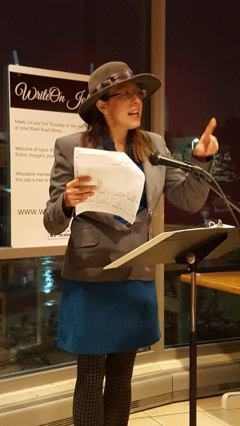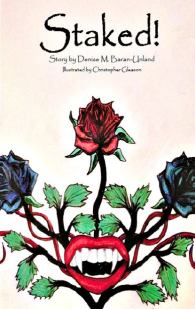
Early Sunday morning, 7 a.m., maybe 8, returning from a long night of delivering newspapers for my wife (her part-time job which I did on weekends to give her a rest), bleary-eyed, thinking only about the bed whispering my name, I pulled slowly around the corner toward the house that we’d called home for only a few weeks.
Then I saw her.
A girl, about 2 years old, clothed in her nightgown, perched nonchalantly on the cul-de-sac curb across the street from our yard.
I parked. Walking cautiously toward her, I imagined the worst – she was lost, or was a tiny runaway escaping some horrible abuse. I asked where she lived. She pointed vaguely behind her. I took her hand and she walked me back to her house, which stood, conveniently, across the street from ours.
I knocked firmly but gently, hard enough to wake but not frighten. A woman, also in night clothes, answered. Strangely, she didn’t seem very surprised to see me holding the little girl’s hand.
Turns out the child was the woman’s daughter, and she (the little girl) had done this Houdini act before. She likes being outside but doesn’t like waiting for an adult to wake up and let her out, Mom explained, unlocking the still-locked door.
Mom, pointing down, said her daughter sometimes just pushes through the screen. Indeed, the screen was popped out. We exchanged names and the child, and I went home to catch as long a nap as the morning would allow.
And so it started…
Twenty-two years of across-the-fence (or in our case, the street) friendship encompassing our two kids and their three, shared newspaper delivery and catering jobs, a few family crises and mutual neighborhood interests.
Better yet, 22 years of the kind of common concern that builds bonds strong enough to survive adolescent disagreements (between the kids, not the adults), a few adult differences of opinion, the inevitable growing apart when the kids got older, even differing politics.
The friendship part continues. However, sadly, the neighbor part is ending.
They lost their house and now must move. (I will not name them here, knowing this is, understandably, a very sensitive subject.)
He, a truck driver, was hurt on the job a few years ago and finally missed more mortgage payments than the bank would let slide. The company wouldn’t let him work, the banks wouldn’t help with the debt.
Now, after countless doctor exams, insurance investigations, unemployment and workers compensation claims, legal to-and-fro-ing and all the other rigamarole that goes with trying to force a corporate entity to do right by its employees, they spent the weekend doing the arduous, sad work of leaving.
My heart broke watching them loading their life into cars and vans and trucks, knowing that they were also taking a part of our lives, too.
Not to mention that no one in the wealthiest nation in the world who is willing to work and earn a living (and they both were –and still are, company doctors and insurance companies be damned) should suffer the indignity of losing one’s home. There’s just an inherent unfairness to it all.
Which is not to say that I don’t understand.
I tried to point out, foregoing our usual political needling, the obvious to my conservative neighbor: in a capitalist world, the only thing that matters to The Company is profit. Employees are expenses. They help create profit. Until they don’t. A truck driver who cannot drive a truck is just a drag on the bottom line.
Plus, all of the benefits he’d received — unemployment, workers comp, and eventually a settlement that will help them move forward — are all the products of generations of liberal battles on behalf of the worker.
He did not seem to grasp the irony. Or maybe he was just too deflated to care.
I share this not to be sentimental.
Though we were neighbors and I will miss them, we didn’t always see eye to eye. Certainly, we were friends, but not the kind who broke bread together, other than the occasional summer barbecue.
More than once I selfishly wondered what it might be like with someone else living across the street. Someone not quite so noisy (especially on any holiday that presented even the flimsiest excuse for fireworks). Not quite so volatile. Not quite so opinionated – or, more to the point, someone with an opinion not quite so opposed to mine.
And then, inevitably, something would happen that demanded assistance or expertise that I didn’t have.
A household repair (especially anything involving electricity). Or a flat tire. Or a dead lawnmower. I’d dispatch one of our kids – “Go get Mr. ____.” Or I’d go over myself and knock on that very same door that I knocked on 1,100 or so Sundays ago. Knowing that they’d always say yes.
Then, in those moments of real and true need, the political disagreements, the Fourth of July thunder that would terrorize our dog, the eardrum-busting volume of music pouring from the garage would just blow away, like dandelion pods, whisked away on a breeze of deep-rooted understanding.
We would chat. Work. Down a few beers. Gossip. Bitch. Commiserate. Laugh (a lot). Celebrate. Even cry every now and then.
Like family.
Like friends.
Like neighbors.
Because in the end, the only real thing between us was a street. And now, for them, that street will no longer lead to home, but rather to somewhere else.
 I learned this week that I had added to a grieving friend’s burden — not through intentional malice, but worse, unintentional absence.
I learned this week that I had added to a grieving friend’s burden — not through intentional malice, but worse, unintentional absence. 
 It’s not that I don’t like vampires per se.
It’s not that I don’t like vampires per se.